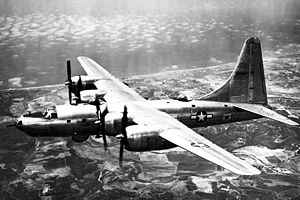
The Consolidated B-32 Dominator (Consolidated Model 34) was an American heavy strategic bomber built for United States Army Air Forces during World War II, which had the distinction of being the last Allied aircraft to be engaged in combat during World War II. It was developed by Consolidated Aircraft in parallel with the Boeing B-29 Superfortress as a fallback design should the B-29 prove unsuccessful. The B-32 only reached units in the Pacific during mid-1945, and subsequently only saw limited combat operations against Japanese targets before the end of the war. Most of the extant orders of the B-32 were canceled shortly thereafter and only 118 B-32 airframes of all types were built.
The engineering development of the B-29 had been underway since mid-1938 when, in June 1940, the United States Army Air Corps requested a similar design from the Consolidated Aircraft Company in case of development difficulties with the B-29.
The Model 33 on which Consolidated based its proposal was similar to the B-24 Liberator. Like the B-24 it was originally designed with a twin tail and a large Davis wing, but with a longer, rounder fuselage and a rounded nose. The powerplants were to be the same quartet of eighteen-cylinder, 2,200 horsepower (1,600Â kW) Wright Duplex-Cyclones, as specified for B-29s. The aircraft was designed to be pressurized, and have remote-controlled retractable gun turrets with fourteen .50Â in (12.7Â mm) machine guns. It was to have an estimated gross weight of 101,000Â lb (46,000Â kg). The first contract for two XB-32s was signed on 6 September 1940, the same day as the contract for the Boeing prototype XB-29.